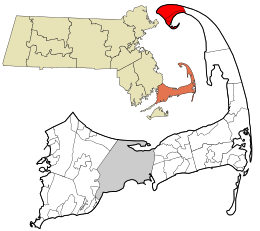Provincetown
| Provincetown, Massachusetts | ||
|---|---|---|
| Town | ||

Aerial view of Provincetown, Cape Cod
|
||
|
||
| Nickname(s): "P-town" or "P'town" | ||
| Motto: "Birthplace of American Liberty" | ||
 Location in Barnstable County and the state of Massachusetts. |
||
 U.S. Census Map |
||
| Coordinates: 42°03′29″N 70°10′44″W / 42.058°N 70.179°WCoordinates: 42°03′29″N 70°10′44″W / 42.058°N 70.179°W | ||
| Country | United States | |
| State | Massachusetts | |
| County | Barnstable | |
| Settled | 1700 | |
| Incorporated | 1727 | |
| Government | ||
| • Type | Open town meeting | |
| • Town Mgr. | David Panagore | |
| • Selectmen |
List of Selectmen
|
|
| Area | ||
| • Total | 17.5 sq mi (45 km2) | |
| • Land | 9.7 sq mi (25 km2) | |
| • Water | 7.8 sq mi (20 km2) | |
| • Federal land | 7.0 sq mi (18 km2) | |
| • Local land | 2.7 sq mi (7 km2) | |
| Highest elevation | 100 ft (30 m) | |
| Lowest elevation | 0 ft (0 m) | |
| Population (2010) | ||
| • Total | 2,942 | |
| • Estimate (2013) | 2,964 | |
| • Density | 303.3/sq mi (117.2/km2) | |
| • Local density | 1,114.4/sq mi (430.3/km2) | |
| (excludes Federal Land; better approximates actual density of the year-round population) | ||
| Time zone | Eastern (EST) (UTC-5) | |
| • Summer (DST) | E. Daylight (EDT) (UTC-4) | |
| ZIP code | 02657 | |
| Area code(s) | 508 Exchange: 487 | |
| FIPS code | 25-55500 | |
| GNIS feature ID | 0618258 | |
| Website | http://www.provincetown-ma.gov/ | |
| Population pyramid 2010 | ||||
| % | Males | Age | Females | % |
| 1.4 | 85+ | 1.8 | ||
| 0.8 | 80–84 | 1.6 | ||
| 1.7 | 75–79 | 2.1 | ||
| 1.9 | 70–74 | 2.3 | ||
| 3.7 | 65–69 | 3.0 | ||
| 5.7 | 60–64 | 5.8 | ||
| 6.2 | 55–59 | 5.2 | ||
| 7.7 | 50–54 | 5.7 | ||
| 7.8 | 45–49 | 4.2 | ||
| 5.1 | 40–44 | 2.8 | ||
| 3.5 | 35–39 | 2.0 | ||
| 2.3 | 30–34 | 2.0 | ||
| 1.9 | 25–29 | 1.8 | ||
| 1.0 | 20–24 | 1.3 | ||
| 1.0 | 15–19 | 1.1 | ||
| 1.0 | 10–14 | 0.8 | ||
| 1.0 | 5–9 | 0.8 | ||
| 0.7 | 0–4 | 1.1 | ||
Provincetown /ˈprɒvɪnsˌtaʊn/ is a New England town located at the extreme tip of Cape Cod in Barnstable County, Massachusetts, in the United States. A small coastal resort town with a year-round population of just under 3,000, Provincetown has a summer population of as high as 60,000. Often called "P-town" or "P'town", the town is known for its beaches, harbor, artists, tourist industry, and its status as a vacation destination for the LGBTQ community.
At the time of European encounter, the area was long settled by the historic Nauset tribe, who had a settlement known as "Meeshawn". They spoke Massachusett, a Southern New England Algonquian language dialect that they shared in common with their closely related neighbors, the Wampanoag.
On May 15, 1602, having made landfall from the west and believing it to be an island, Bartholomew Gosnold initially named this area "Shoal Hope". Later that day, after catching a "great store of codfish", he chose instead to name this outermost tip of land "Cape Cod". Notably, that name referred specifically to the area of modern-day Provincetown; it wasn't until much later that that name was reused to designate the entire region now known as Cape Cod.
On November 9, 1620, the Pilgrims aboard the Mayflower sighted Cape Cod while en route to the Colony of Virginia. After two days of failed attempts to sail south against the strong winter seas, they returned to the safety of the harbor, known today as Provincetown Harbor, and set anchor. It was here that the Mayflower Compact was drawn up and signed. They agreed to settle and build a self-governing community, and came ashore in the West End.
...
Wikipedia

